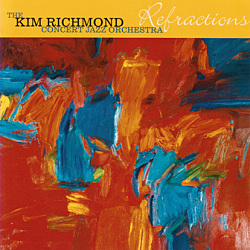MUSIC REVIEW BY Adam Greenburg, All Music Guide
Los Angeles saxophonist Kim Richmond's album Refractions involves a full orchestra of players and that was done for the orchestral effect rather than the big band idiom you would usually expect. Richmond likes to blend concepts from the classical realm with those from the jazz realm, and full classical orchestration is one part of that. The main thrust of this idea is to provide for a deeper, more cinematic sound that is capable of conveying the broader emotional abilities of classical music while hopefully holding on to the rhythm and swing of jazz. The effect, at times, is perhaps underused, as only a handful of players may be taking the spotlight at a given time, but even in these portions the rest of the large ensemble is poised to step back in with a large-scale orchestra hit. The main feature that takes the listener's interest is going to be the instrumentation. In between more standard jazz motives, a line of flutists or French horns can slide in with their distinctive sounds, or the percussionist might switch over to the tympanist for a spell to drive home a finale to its fullest potential. There are aspects of cool jazz and fusion inherent in the sounds, with a thick dose of the cinematic jazz of the '70s, but there is always that touch of third stream that makes the catches. The compositions and arrangements work well for the group (aside from a primarily smooth jazz rendition of "America the Beautiful" that seems a bit trite), taking in ideas from around the jazz world before they are done and leaving a proper slot for each performer to drop in a nice solo or two. For cinematic jazz scoring, this album is a standout in an otherwise sparse field.
Soundclips
Other Reviews of
"Refractions":
Mainly Big Bands by John Killoch
Jazz Review by Woodrow Wilkins
All About Jazz by C. Michael Bailey
Ex Cathedra by Reverend Bob
All About Jazz by Dan McClenaghan
Music Dish by Ben Ohmart
All About Jazz by Jack Bowers
